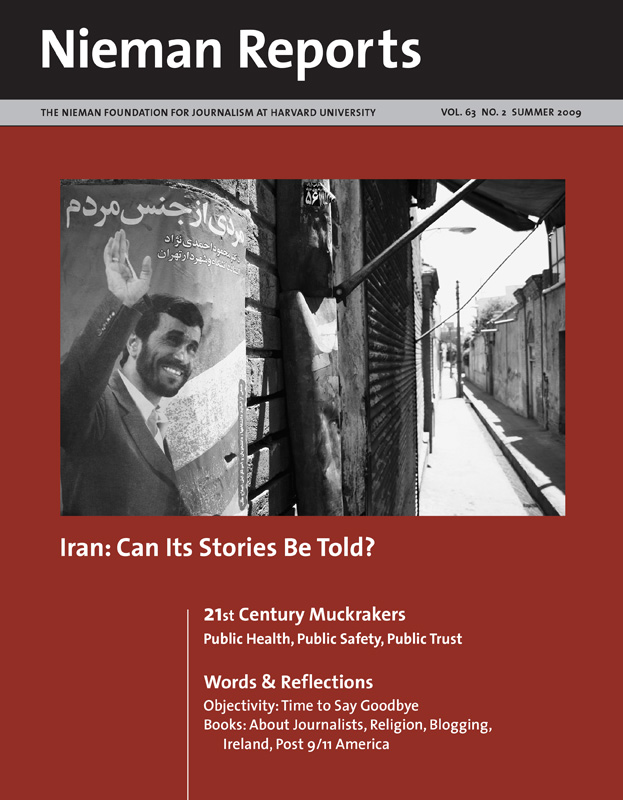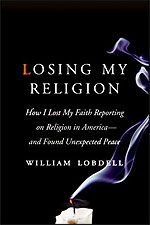William Lobdell’s memoir about covering religion for the Los Angeles Times wasn’t an easy book for me to read. As I turned the pages of “Losing My Religion: How I Lost My Faith Reporting on Religion in America—and Found Unexpected Peace,” my coffee grew cool, and I felt myself getting hot.
Agenda journalism has that affect on me. Listen to how Lobdell describes landing a gig writing a religion column for the newspaper’s Orange County edition: “I felt like one of the last tumblers in my Christian life had clicked into place. I was certain that God had made it happen; I was just His vessel.”
What came tumbling back to me were memories of my first years as religion and ethics editor of The San Diego Union-Tribune. I took the job in 1992 and almost immediately began attending the annual conventions of the Religion Newswriters Association (RNA), which represents journalists who cover religion in the secular media. With 19 years of experience in newsrooms from Washington State to California, I was appalled at some of what I encountered at the RNA meetings. Several religion reporters openly shared with me about how they felt their beat was a calling from God. Some wore crosses around their neck. At least one was an ordained clergyman, who wrote stories during the week and did baptisms on the weekend.
They were friendly and, I presumed, talented people. But how could their news organizations allow them to cover this beat? Had they not heard of their profession’s code of ethics, especially the one about the need to maintain independence? Here’s how the Society of Professional Journalists puts it: “Avoid conflicts of interest, real or perceived. Remain free of associations and activities that may compromise integrity or damage credibility.”
I gravitated toward like-minded colleagues dedicated to promoting more aggressive journalism within our ranks. People like David Briggs, then the national religion writer for The Associated Press; Laurie Goodstein, who is now with The New York Times, and Gayle White, former religion reporter for The Atlanta Journal-Constitution.
I gradually came to believe that religion writing was the chink in the armor of many newsrooms. Adherence to belief directly related to the subject at hand would be intolerable on other beats, yet on this one it was quietly accepted.
Missionary Zeal
“Losing My Religion” confirms that it wasn’t only smaller publications that fell victim to this misguided embedding. Read what Lobdell writes as he moved from religion columnist to full-time religion reporter for the Times: “God had answered my prayers more completely than I could have ever imagined …. I would be able to shape religion coverage at one of the nation’s largest media outlets.”
There was no wall between the beat and reporter. He was on a mission to promote religion with all the fervor and zeal of his own born-again faith. As I continued to read, I kept shaking my head. When I was on the city desk of various newspapers, I would caution reporters about not crossing the line between participant and observer. “Do that,” I would tell them, “and you stop listening with both ears and seeing with both eyes.” It’s like a soldier who stops paying attention in a minefield; the next step he takes could explode in his face. The reporter isn’t the only casualty when this happens. The collateral damage includes readers—and their trust.
A telling example of this danger happens early in his book, when Lobdell acknowledges that he set aside a pile of depositions and reports given to him by another reporter concerning Catholic sexual abuse allegations. He had “much more inspiring stories” to do, especially since he was not on the fast track to becoming a Catholic himself.
I admire his candor about this explosive story. I also admire his subsequent scrambling when the scandal could no longer be ignored. To his credit, he began doggedly chasing the Los Angeles Archdiocese’s wrongdoings, which would culminate in the largest settlement in the nation with victims of childhood sexual abuse.
His coverage of the Catholic scandal then opened up stories about other controversies—from Mormon excommunications to a two-part series detailing the lavish spending by founders of the Trinity Broadcasting Network, a worldwide television empire based in Orange County.
During this time, Lobdell went from promoting religion to deciding it was his mission to right its wrongs. “The Body of Christ was sick,” he writes. “My investigative reporting skills could help uncover the infection and promote the healing. I was sure this had been part of the Lord’s plan for me all along.”
Guess what happened next? As the title suggests, Lobdell loses his faith. He had blurred the lines between his profession with his personal beliefs so completely that covering the human foils of organized religion and its byproducts was too much to bear. Before leaving the Los Angeles Times last year, Lobdell wrote a front page confession of this journey, which led to him to write this book. He is a compelling, gifted writer. His conversational style served him well in journalism as it does on the pages of his book. But his writing skills provide little solace for my indignation and my sadness, for him and for my beloved profession.
Lobdell is right about one thing. When he began thinking about becoming a religion reporter, editors regarded the beat as “an antiquated part of newspaper tradition.” Today, editors are killing the beat or scaling it back dramatically. One excuse given is the results of marketing surveys, which apparently show little reader interest in religion coverage. Since roughly eight out of 10 people say they believe in God, and about half that number practices a faith regularly, I have a hunch the problem lies more in how the questions are being asked than what the surveys have so far revealed.
Regretfully, I fear Lobdell’s book might give editors more ammunition to distance their newsrooms from covering religion. As for readers, I worry it will give them another reason to lose faith in our ability to inform and equip them in an unfettered, independent voice. On the other hand, if the pendulum swings back toward increased interest in covering what people believe and how they behave based on those beliefs, perhaps his book will serve as a compass pointing toward which reporters to assign to this beat—and which to put on a different one.
Sandi Dolbee was the religion and ethics editor of The San Diego Union-Tribune and a one-time president of the Religion Newswriters Association. She is a two-time winner of the Religion Reporter of the Year award and has been honored by the American Association of Sunday and Feature Editors, the San Diego chapter of the Society of Professional Journalists, and the San Diego Press Club.



 Losing My Religion: How I Lost My Faith Reporting on Religion in America—and Found Unexpected Peace
Losing My Religion: How I Lost My Faith Reporting on Religion in America—and Found Unexpected Peace